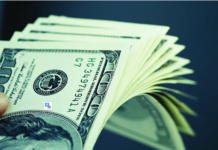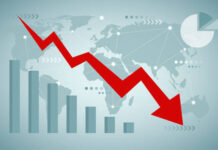
Prime minister’s economic affairs adviser Mashiur Rahman, National Board of Revenue chairman Md Mosharraf Hossain Bhuiyan, Federation of Bangladesh Chambers of Commerce and Industry vice-president Siddiqur Rahman, NBR member (customs audit, modernisation and international trade) Khondaker Muhammad Aminur Rahman and World Bank Group senior economist and BICF programme manager M Masrur Reaz are seen, among others, at the publication ceremony of ‘Customs Modernisation Strategic Action Plan for 2019-2022’ jointly organised by NBR and Bangladesh Investment Climate Fund of International Finance Corporation at Hotel InterContinental in Dhaka on Wednesday. — New Age photo
Many big businesses are claiming that their annual turnover is less than Tk 3 crore, apparently to avail advantages offered to the small businesses under the new VAT law, said National Board of Revenue chairman Md Mosharraf Hossain Bhuiyan on Wednesday.
Value-added tax officials should be aware about the phenomenon so that revenue collection was not affected, he said at a publication ceremony held at Hotel InterContinental in Dhaka.
NBR and Bangladesh Investment Climate Fund of International Finance Corporation jointly organised the programme to unveil the Customs Modernisation Strategic Action Plan for 2019-2022.
Under the new VAT and Supplementary Duty Act-2012 that took effect on July 1 imposed VAT at 15 per cent on actual sales, with some exceptions, of large traders with annual turnover above Tk 3 crore.
VAT rate for traders having annual turnover between Tk 50 lakh and Tk 3 crore was set at 4 per cent while small traders with annual turnover up to Tk 50 lakh were exempted from payment of VAT.
‘Our experiences say that most of the businesses are now trying to claim that their annual turnover is below Tk 3 crore,’ Mosharraf said.
Annual turnover worth Tk 3 crore was not so big for large-scale businesses, he said.
VAT officials as well as traders should be vigilant on the issue to keep revenue collection protected, he said, adding that the installation of electronic fiscal devices (EFD) should also be expedited to prevent the trend.
He also instructed NBR officials to improve their skills instead of lobbying for posting at some specific offices.
Prime minister’s economic affairs adviser Mashiur Rahman advised the revenue board to act timely and improve attitude towards the issues of trade facilitation.
He said that it was very difficult to have an efficient tax system without understanding the cost of not acting on time.
Improving skills of manpower, attitude of tax officials, proper human resource management and enable environment are also important to improve ease of doing business, he said.
Federation of Bangladesh Chambers of Commerce and Industry vice-president Siddiqur Rahman said that the government should find why bank interest rate was not coming down and why entrepreneurs were not getting loans from banks.
Once everyone would say that there was excess liquidity in banks but then there was no money in banks, he said, asking where did all the money go.
NBR member (customs audit, modernisation and international trade) Khondaker Muhammad Aminur Rahman said that they prepared the customs modernisation plan as a practical road map to implement the WTO TFA.
It is a comprehensive development plan for Bangladesh Customs with time-bound, evidence-based and resulted-oriented activities to be implemented in the next four years, he said.
Implementation of the plan would also help the country to improve the ease of doing business and expedite release of goods from port, he said. World Bank Group senior economist, also BICF programme manager, M Masrur Reaz said that modernisation of customs was a pivotal for continuation of Bangladesh’s further growth aspiration and to enhance export competitiveness in global market.
Source: New Age.









